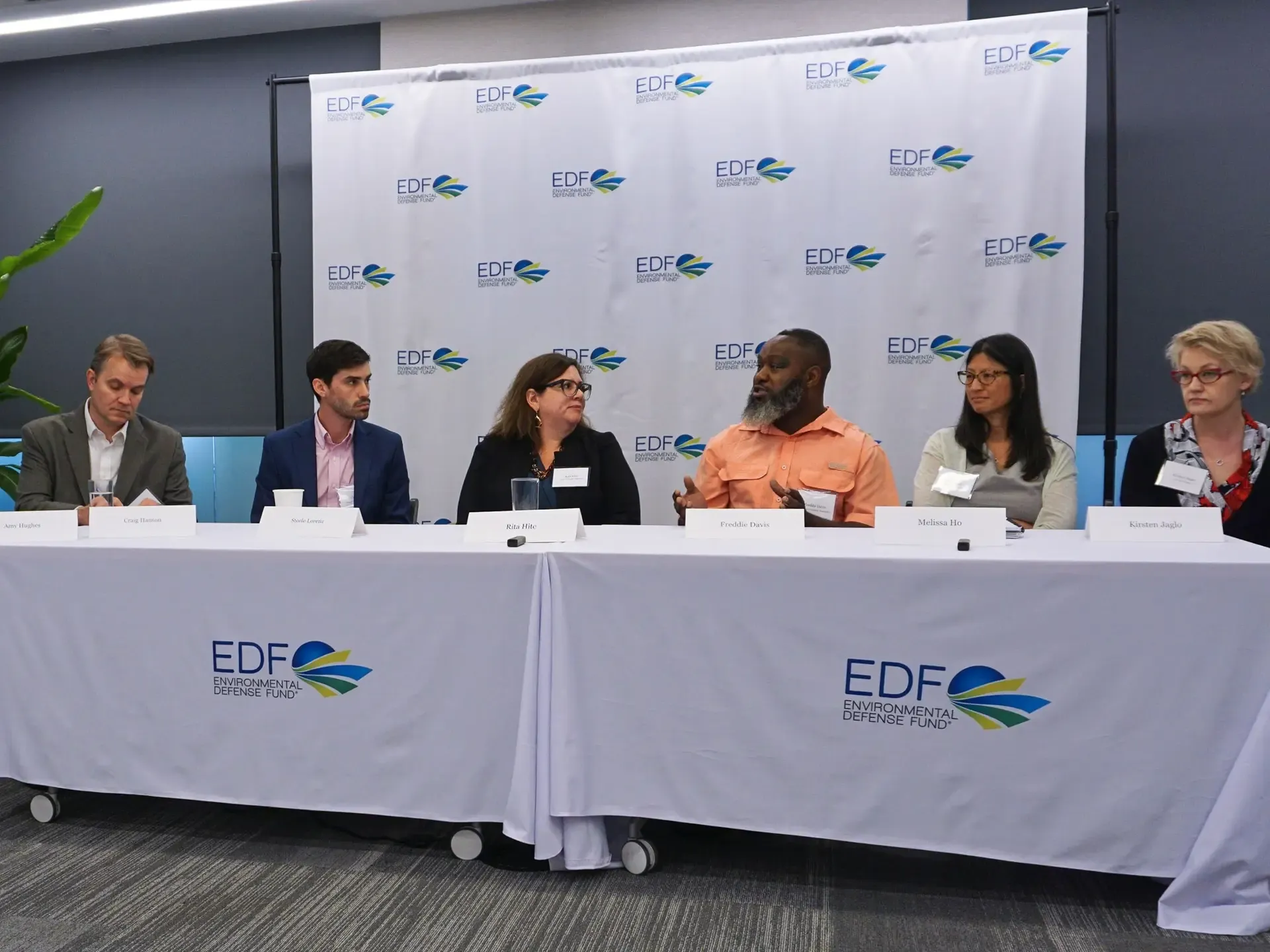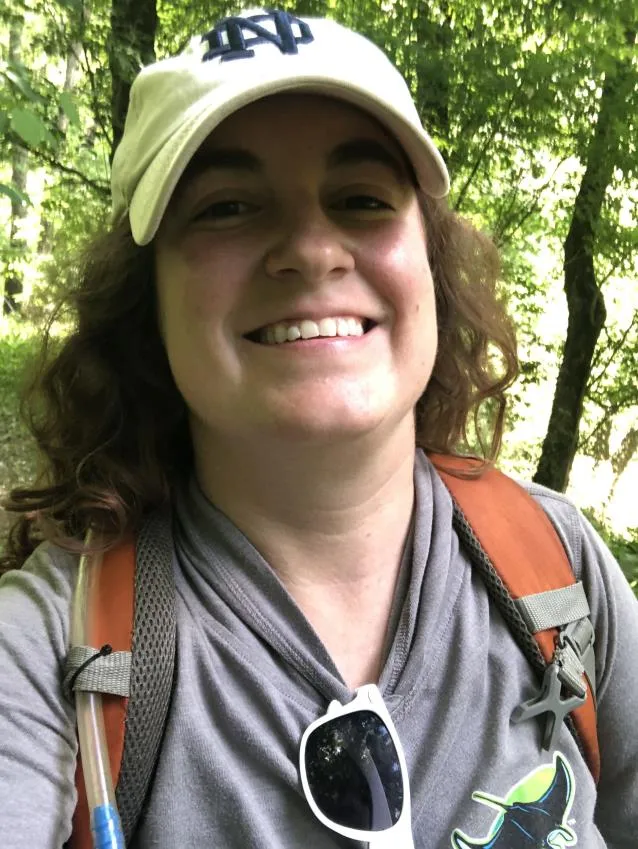Three Carbon Market Takeaways from Climate Week 2022

American Forest Foundation CEO Rita Hite (center left) shares the opportunity that voluntary carbon markets present to small acreage landowners at the Environmental Defense Fund headquarters.
This year’s Climate Week brought together global climate leaders from business, government, NGOs and civil society with the theme of “Getting It Done.” The American Forest Foundation was among the participants that discussed critical challenges and innovative solutions developing within the voluntary carbon market. Here are three important themes we identified for investors and corporate buyers.
What we are trying to do is reach down and say, could we actually get to a 30-acre landowner? Through [FFCP], we are providing climate benefits at scale, but implementing locally. Local foresters, local forest management and local resources.
Scaling the Voluntary Carbon Market in the Right Direction
One fact was emphasized — to mitigate the carbon emissions needed to stay within a 1.5°C planetary threshold, carbon markets are a needed tool among other greenhouse gas emissions reduction efforts. But the voluntary carbon market must scale dramatically in the near term for it to be effective long-term. This means there is a strong need for more carbon project financing.
At a panel hosted by the International Emissions Trading Association, leaders shared challenges facing investors today. For example, as the size of the market scales, so too does the variance in project type and quality. Older carbon projects may be established, but may not have as strong claims to carbon additionality or permanence, nor are all new projects prioritizing transparency over profit. On the panel, Verra CEO David Antonioli shared how climate investors must be able to identify and invest in high-quality carbon projects to move the market in the right direction. He emphasized that transparency and traceability will be key strategies that need prioritization.
Another way to identify high-quality projects will be to look beyond the base layer of a project’s carbon sequestration and storage to its co-benefits. On the same panel, Managing Director of Ecosystem Marketplace Stephen Donofrio noted that buyers are willing to pay more for credits from projects that include co-benefits such as improving biodiversity and supporting the economic needs of local communities.
Higher Quality, Higher Integrity
Integrity was also a hotly discussed topic, and for good reason. A well-functioning carbon market must answer, “What does the planet actually gain from this market?” This question cannot be answered truthfully without real and measurable carbon removals at its foundation.
Attendees discussed needed guardrails and guidelines for both carbon project developers and offset buyers on what meets the threshold for “high quality.” Most agreed that the Core Carbon Principles, currently under development by the Integrity Council for Voluntary Carbon Markets (IC-VCM), represent an important step forward in providing assurances of trust and quality. The Core Carbon Principles would align processes and a framework for what's acceptable in creating carbon projects and for verifying carbon credits across carbon crediting registries such as Verra, Gold Standard and the American Carbon Registry. From a carbon buyer’s perspective, this will make it easier to properly valuate and compare which projects and credits are high-quality.
The public commenting period for the Core Carbon Principles closed just after Climate Week, and AFF, among others, contributed comments to ensure any principles include inclusive participation opportunities for landowners and recognition of the use of dynamic baselines for higher integrity carbon accounting.
Equitable Opportunities
Last, heard loudly throughout Climate Week was the need for building out more equitable opportunities for participation throughout the value chain. From developers to buyers to landowners, everyone should be able to play a role in climate action via market-based solutions.
Speaking at the Environmental Defense Fund headquarters in conjunction with the release of the “Ambitious Climate Mitigation Pathways for U.S. Agriculture and Forestry: Vision for 2030” report, AFF’s CEO Rita Hite shared how the Family Forest Carbon Program is providing inclusive options to help small forest landowners enter and benefit from carbon markets. Historically, market opportunities have only been accessible by large 5,000+ acreage land holders. Less than 1% of the land in carbon projects has been on small acreages, yet small forest landowners own nearly 40% of the forests in the United States and hold 65% of the potential for forest-based climate solutions. Hite said, “What we are trying to do is reach down and say, could we actually get to a 30-acre landowner? Through [FFCP], we are providing climate benefits at scale, but implementing locally. Local foresters, local forest management and local resources.” Director of Rural Training and Research for the Federation of Southern Cooperatives, Freddie Davis, added, “The market is finally recognizing that [family landowners] exist. We work on behalf of minority landowners. We are dealing with a vulnerable population and we battle daily against practices of the past, but we know there’s a win-win opportunity here.”
Climate Week 2022 showed that today’s voluntary carbon market is a key tool needed in “Getting It Done” for the climate. If you share our sense of urgency in moving the market toward success, inclusion and equity, learn more and take action at familyforestcarbon.org.
Related Articles

July 1, 2025
Forester Spotlight: Sarah Cawood
We’re excited to highlight Sarah Cawood, a dedicated forester with the Family Forest Carbon Program (FFCP) who brings enthusiasm, experience, and a strong commitment to conservation to her work.

June 3, 2025
Why Wildlife Loves Loblolly—And How These Pines Can Benefit Your Land
A quiet stretch of pine trees can offer more than just scenery—it can provide vital habitat for wildlife across every season. Loblolly pine, the most common native tree species in the Southeast, plays a particularly important role in creating habitat for a wide variety of game and non-game species, from wild turkeys and rabbits to songbirds and squirrels.

May 28, 2025
New Report Details Innovative Approach to Permanence for Natural Climate Solutions
The American Forest Foundation released today “A Trust for Permanence: Enabling a New Generation of Permanent Nature-Based Credits in the Voluntary Carbon Market,” a new concept paper that details an innovative approach to ensuring the quality and integrity of credits produced through natural climate solutions (NCS).